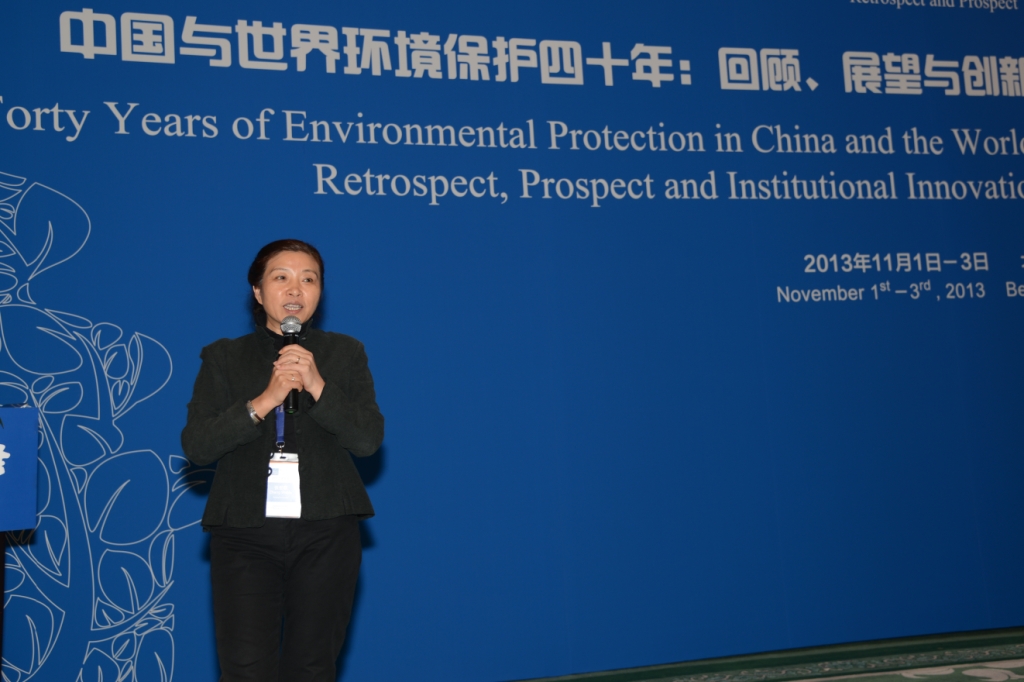
The first session of Beijing Forum (2013) Panel IV —“Forty Years of Environmental Protection in China and the World: Retrospect and Prospect and Institutional Innovation”, which co-sponsored by College of Environmental Sciences and Engineering of Peking University and Center for Environmental Education and Communication (CEEC) of Ministry of Environmental Protection of China, was held in Diaoyutai State Guest House on the afternoon of Nov.1st, 2013.The theme of this session is “Media, Public Participation and Environmental Protection”. Professor Zhang Shiqiu from Peking University chaired the presentation section.

Figure.1 Professor Zhang Shiqiu
Director Jia Feng from CEEC of Ministry of Environmental Protection delivered the speech titled“Media and Public Participation in China: Practice and Challenges”. He presented three aspects about media and public participation: Firstly, with society revolution, media especially new media plays more important role in environmental protection. Secondly,government should promote public participation based on legislation system. Thirdly, he discussed the challenges government confronted on environmental protection such as insufficiency of public information transparency, ignorance of public participation and lack of effective communication. Finally, he recommends several ways on how to promote public participation: 1) making a better recognition of public participation; 2) improvinglegislation system; 3) establishing sun shine government; 4) support the development of environmental NGOs; 5) making better use ofmass media;and 6) strengtheningpublic environmental education.
Ms Hu Jincao, senior producer of News Probe from CCTV shared her past 17 years of working experiences on environmental reports and interactions with public stakeholders, government as well as other social groups. Her presentation mainly addresses how media should convey the facts of environmental issues and what can media do in solving these environmental issues. Ms Hu also shared her reflection in how to attract the public’s in-depth concern on environmental issues in this information over-abundance era.
Mr Zhu Hongjun, editorial committee member from Southern Weekly summarized history and revolution of Southern Weekend as commercialized media on environmental coverage.Compared to government–oriented media, he pointed out the commercialized media has more interactive dialogue with the public to generate transparent information about public concerns on environmental issues.Southern weekendmakes great achievement by carrying out some creative measures including: 1) expansion of the news focus on regional, local and national level; 2) in-depth and comprehensive analysis; 3) inspiration and supervision; 4) more discussion of actual problems in the reports; and 5) flexible and adaptive based on actual situation. Finally he discussed the challenges they encountered. His presentation concluded with reflections on the importance of public monitoring, supervision and awareness on the environmental issues, and the significant platform that medias develop through which actual information about environmental issues are being delivered.
Mr Liu Xinsheng from Texas A&M University introduced his research on Chinese Public Concern for Environmental Protection. According to the nation-wide public opinion survey data and province-level statistics, he demonstrated that the levels of Chinese citizen’s concern for environmental protection are not only rooted in individual’s social-demographic characteristics and personal experience of pollution events,but also affected by regional macroeconomic conditions,local environmental risks and provincial government investment in pollution treatments. Based on these findings, the presentation deliver several major policy implications including promotion of environmental concern among the rural regions, improving education of younger generations, more media exposures and reports to promote environmental awareness campaign, increase education and family income, economic development as well as increase governmental investment on pollution treatment.
Ms. Isabel Hilton, founder of China Dialogue,mainly discussed the publication participation and access to information from international and European experience. Shesuggested that firstly,the government should identify the range and types of environmental information to public.Secondly, the government should disclose information timely and accurately though mass media and new media. Thirdly, the bi-directional relationship between information and public participation can promote effective environmental policies.
Mr Helmut Kranzmaier, partner of the Communication &Network Consulting AG in Germany, took Stuttgart 21 protest movement as an example, analyzed the characteristics of the protest movements and put forward feasible measures to cope with environmental demonstrations as follow: 1)starting an information disclosure and dialogue utilizing all communication instruments; 2) supporting of proponents through information disclosure and coordination; 3) activating corporations as advocates alliance partners and sponsors; 4) cross-media accompaniment of fact mediation; and 5) monitoring of the communication’seffectiveness by introducing an early warning system.
At the end of the first section, the hostess Prof. Zhang Shiqiu made very brief but illuminating summary remarks on the speakers’ presentations.